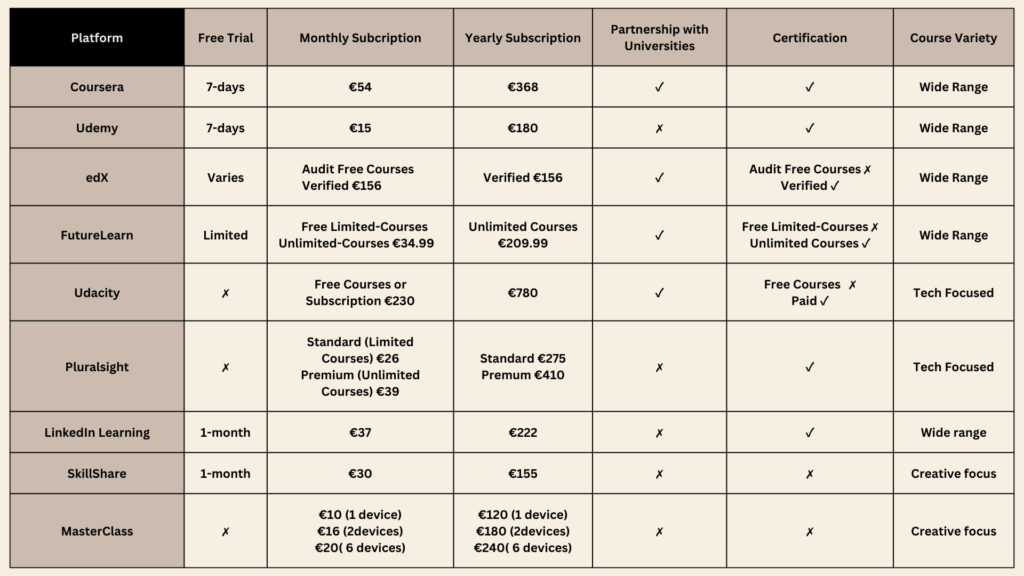
22 May The Online Course Explosion: Navigating Quality in a Crowded Market
The rise of online courses has transformed how we learn new skills and acquire knowledge. Today, anyone with an internet connection can find a course on almost any subject. But with this vast availability comes a significant challenge: how do we assess the quality of these courses?
A Trend of Quantity Over Quality?
With the variety of AI tools available today, creating and marketing online courses has never been easier, allowing experts to effortlessly share and monetize their knowledge. A troubling trend in the online course market is the rise of self-proclaimed experts which introduces a risk of low-quality content flooding the market. This raises an important question: as this trend continues, how do we ensure that the quality of online education is worth the pay, and minimize the risk of being scammed by the self-proclaimed experts?
Evaluate the Quality of Online Courses
While it can be challenging to shield yourself from overhyped online courses, there are several steps you can take to minimize the risk of paying more than a course is worth and losing money. As a consumer in the online learning market, exercising critical thinking is key. The following are important points that aim to help you make an informed decision when choosing your online course.
Research the Instructor
Before signing up for any course, spend some time looking into the instructor’s background. What qualifications do they have? What real-world experience do they bring to the table? True experts usually have a clear educational background or credentials that are easy to verify. If this information is vague or missing, it’s a strong indicator that the instructor may not be as qualified as they claim.
Course Content and Pricing
Evaluate whether the course’s content justifies its price. Does the course offer in-depth learning, or does it just skim the surface? Make sure to review the course syllabus and content. Low-quality courses often don’t have the option to review the course syllabus and content or lack a coherent structure and depth. If the course outline seems disorganised, overly simplistic, or fails to cover advanced topics comprehensively, it’s likely not worth your time or money. High-quality courses should have a logical progression and provide in-depth coverage of the subject matter.
Also, checking how long the course has been available is important, as courses that have been available for several years are more likely to be proofed by a large number of individuals. On the contrary, newer online courses may not have had enough time to demonstrate their value, so it’s wise to approach these with caution. You can also assess whether the duration of the online course is realistic for gaining knowledge on a particular topic. Consider if the allocated time is appropriate or if it seems too short or too long.
Peer Recognition
Spotting a ‘self-proclaimed expert’ involves looking for peer recognition or endorsements from respected figures in the field. Legitimate experts are often recognized by their peers and have a track record of collaboration or acknowledgment from reputable institutions or professionals. If the instructor lacks any form of peer validation, it’s a reason to be skeptical.
Marketing Gloss Over Educational Substance
High-quality videos and persuasive ads can make an online course seem more legitimate and effective than it is, with more emphasis on marketing strategies than on educational quality. This compelling nature of marketing strategies makes it even more critical for individuals to look beyond the surface and evaluate what’s truly being offered.
Understanding the Real Worth of Course Certifications
With many new online courses, there’s often a shiny certificate offered at the end, but what does that certificate really mean? Unlike certificates from accredited institutions, many new online course certificates don’t hold much weight in the professional world. They look good on paper, but they might not actually signify that the holder has gained substantial skills or knowledge. This is especially concerning when individuals want to use these course certificates to try to advance in their careers. Therefore, ensure you research the credibility of a certificate by verifying it has been accredited by reputable institutions and assessing whether it will add significant value to your qualifications.
Seek Recommendations from Others
Seeking recommendations from mentors, supervisors, or successful professionals in your field is a safe strategy for finding high-quality courses. These individuals often have valuable insights and firsthand experience with various educational resources. Seeking their course suggestions allows you to benefit from their knowledge and avoid the trial-and-error process of evaluating courses on your own. Their recommendations can help you choose programs that are well-regarded and aligned with your career goals, ensuring that your investment in learning is both effective and worthwhile.
Look for Online-Courses Accredited or Well-Known Platforms:
Platforms that collaborate with universities or renowned institutions often maintain a higher standard of course quality. These courses might be more reliable than standalone offerings by individuals. Here are some of the well-known platforms that offer a variety of high-quality online courses:
- Coursera is partnering with top universities and companies, and offers a wide range of courses, specializations, and degrees in various subjects, from computer science to business. It has a 7-day free trial and offers a subscription starting at 54 monthly with the possibility to cancel at any time.
- Udemy is a popular platform where experts can create and share their courses. It offers a vast selection of courses on numerous topics, including technology, finance, marketing, arts, etc. It has a 7-day free trial and a monthly subscription of €15 with the possibility to cancel at any time. Another possibility is to purchase a single Udemy course and get lifetime access to that course and course material only courses usually vary in price €19.99-€219.99.
edX is founded by Harvard and MIT, provides high-quality courses from leading institutions worldwide, covering a diverse array of disciplines, including data science, engineering, and humanities. It offers a lot of amazing and free online courses. It offers 2 tracks: ‘Audit Track’ and ‘Verified Track’.
With Audit Track, you will have temporary access to course materials except for graded assignments, and you will not earn a certificate at the end of the course. However, you will be able to access the free content for the estimated course length. If you decide to go with the Verified Track you will also get verified certificates, graded assessments and exams, and access to videos/readings after the course end date. In other words, If you require a certificate of completion then you will need to pay anywhere between €45-275 depending on the course.Skillshare focuses on creative education, offering courses in areas such as design, photography, video, and freelancing. It encourages a community-based learning approach. The monthly membership is free to try for one month. After the trial, a monthly membership is €30 per month, and the annual Premium membership is €155 for the year.
FutureLearn is another platform partnering with leading universities and organizations. It provides courses, programs, and degrees on a variety of subjects, emphasizing social learning through discussion and interaction. It offers 3 plans, including a free plan with a limited number of courses, an unlimited monthly plan of €34.99, and a yearly plan of €209.99.
Pluralsight is aimed at tech professionals, it offers courses in IT, software development, data science, and cybersecurity, providing skills assessments and learning paths to help users progress. It offers a standard plan at €26 per month (5000 courses available, certification excluded) and a premium plan at €39 per month (7000+ courses available, coding projects and challenges, certification).
Udacity is known for its “Nanodegree” programs, the platform provides courses in technology fields like artificial intelligence, programming, and data science, often developed in collaboration with industry leaders. Udacity offers some free courses and content, but these free offerings are limited and do not include the full range of features available with the paid subscriptions. The monthly plan is approximately €229. It also offers a 4-month plan at approximately €779 and is designed to provide sufficient time to complete a Nanodegree program, which typically takes around four months.
LinkedIn Learning offers unlimited access to 21,000+ expert-led courses in business, technology, and creative skills, integrating with LinkedIn to provide personalised recommendations based on your professional profile. LinkedIn offers a 1-month free trial and a monthly subscription at €39.99 per month.
MasterClass offers high-quality courses taught by world-renowned experts and celebrities across various fields. Unlike other learning platforms like Coursera or Udemy, MasterClass combines education with entertainment, featuring engaging video lessons from notable figures such as Gordon Ramsay, Martin Scorsese, Margaret Atwood, and Hans Zimmer. While it may not dive as deeply into subjects as other platforms, it provides an entertaining look at the techniques and experiences of top professionals. If you feel like learning in a fun way, perhaps, swapping your Netflix account for a MasterClass subscription is a great way to start. The standard subscription starts at €10 per month, and you get access to all 200+ classes across 11 different categories.
Reflecting on the Bigger Picture
Undoubtedly, new AI advancements have greatly simplified online course creation. As a result, the number of available courses has reached an all-time high, providing us with a vast and exciting range of options to choose from. However, this ease of course creation also opens the door for self-proclaimed experts, flooding the market with potentially low-quality content. In this crowded and often overwhelming marketplace, where quantity can easily overshadow quality, it’s crucial to approach online learning with a discerning eye.
In such a folded market, following the tips outlined in this article helps individuals make well-informed choices when purchasing online courses. This includes researching the instructor’s qualifications, evaluating the course content for depth and structure, and seeking recommendations from trusted professionals.
Additionally, strong marketing strategies often trigger a fear of missing out, persuading us to buy impulsively and pay more than the actual value of an online course. So, instead of impulsively buying a course you found on social media, consider turning to well-established, accredited platforms known for their high standards. These reputable platforms often collaborate with universities and industry leaders, and provide a more reliable pathway to quality education, ensuring that your investment in learning yields valuable and substantial returns.
By being more critical and selective, learners can avoid wasteful investments and make the most of the opportunities in this overwhelmingly growing space. As we continue to embrace online learning, let’s strive for a culture that values depth, quality, and genuine expertise over superficial content and flashy marketing.


Sorry, the comment form is closed at this time.